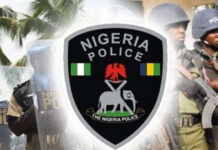
A new opinion poll conducted by the Nigerian Human Rights Community, consisting of 134 organisations, has tipped the presidential candidate of the All Progressives Congress, Senator Bola Tinubu, to win the 25 February 2023 general election.
The group, at a press conference addressed by its Secretary-General, Taiwo Adeleye, in Lagos yesterday where it released its poll result, projected that Tinubu would win based on the analysis of the preferences of 19,365 persons that its researcher polled in January.
“The Nigerian Human Rights Community, NHRC poll revealed that the presidential candidate of the All Progressives Congress (APC), Bola Ahmed Tinubu holds a magnificent lead and is on course to win the 2023 general elections,” it said firmly, explaining, “The Polls also confirm a two-horse race for the second position between Atiku Abubakar of the Peoples Democratic Party (PDP) and Peter Obi of the Labour Party (LP), while Rabiu Kwankwaso of the NNPP came a distant fourth as all other contestants together scored an insignificant total.”
According to it, 7,940 (41%) of those interviewed across the 774 local governments in the 36 states of the federation and Abuja said they preferred the candidate of the APC; 5,035 (26%) indicated Peoples Democratic Party’s Atiku Abubakar; 4,067 (21%) supported Labour Party’s Peter Obi; while 1,743 (9%) rooted for New Nigerian Peoples Party’s Rabiu Kwankwaso. The other parties’ candidates collectively got 1,162 (6%) of the respondents.
The poll results also predicted an outright win for Tinubu in 17 states (Lagos, Ogun, Oyo, Osun, Ondo, Ekiti, Cross River, Kwara, Kogi, Nasarawa, Niger, Kaduna, Zamfara, Jigawa, Borno, Yobe and Gombe), securing 25 per cent of the respondents in 14 other states (Imo, Ebonyi, CRS, Edo, Benue, Plateau, FCT, Kano, Katsina, Kebbi, Sokoto, Adamawa, Bauchi, and Taraba), making 30 states and the Federal Capital Territory.
His closest rival, Atiku, is projected to win seven states, including Adamawa, Taraba, Sokoto, Edo, Akwa Ibom, Bayelsa, and Delta.
The respondents gave seven states to Obi also. They include Anambra, Enugu, Imo, Ebonyi, Abia, Benue, and Rivers. He is also projected to win in Abuja.
Kwankwaso got only his Kano home state, while the three frontrunners are projected to battle for spaces in five states, Kebbi, Katsina, Bauchi, Plateau, and Rivers.
Explaining its methodology, the group, which pointed out that the research took six months, said it employed random sampling, noting that the questionnaires were in the three major Nigerian languages, Yoruba, Igbo, and Hausa as well as pidgin.
It revealed, “From a socio-economics standpoint, religion, ethnicity, insecurity, inflation, rising poverty, and unemployment will be the determining factors during the February 25th presidential elections.
“While party loyalty, candidate integrity, political will, and track record will dominate the political reasons for voting. In addition, social media, mobile communications, and, INEC’s decision to embrace the use of technology will create more awareness and influence voters’ visions, while also curbing vote rigging and electoral violence.”
It said its deductions were based on careful consideration of the respondents’ views on religion, ethnicity, party loyalty, and integrity of the candidates, adding that respondents from the North-west, North-east and some North-central states indicated their willingness to vote based on party loyalty and religion with APC enjoying more party loyalists within a Muslim-dominated population.
It said the Southwestern states were likely to vote based on historical factors that favor the APC presidential candidate, being a former Lagos State governor with a far-reaching network and consistent political activities since 1991, grassroots campaign of the APC, incumbency factor of the APC controlled state governments in the South-west, party loyalty and ethnicity, which will equally favor the APC.
According to it, the Labour Party will enjoy an overwhelming majority in the South-east due to ethnicity and religious sentiment, while states like Plateau in the North-central might align with these sentiments to register sizeable votes for the Labour Party on the basis of religion.
The group said the study foresaw the PDP maintaining a significant presence in its traditional areas of the South-South and the two North-east states of Adamawa and Taraba while getting significant percentages in most North-west and North-east states.





